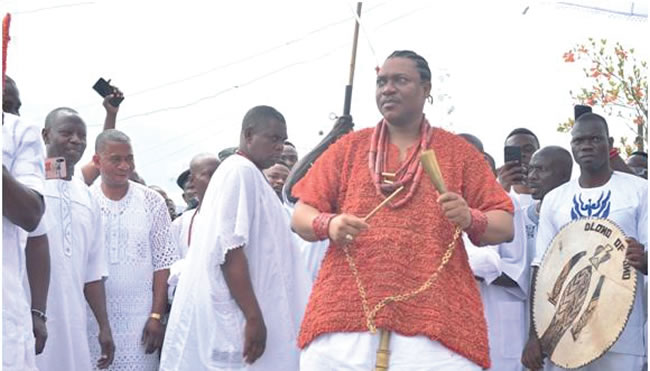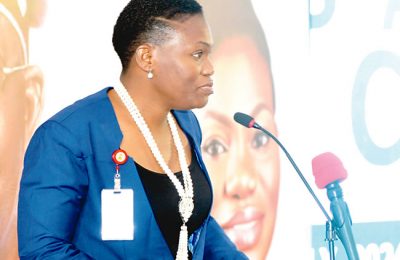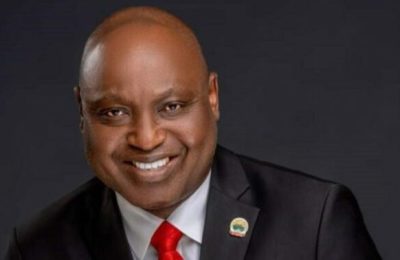OWO is an ancient town in Ondo State, Nigeria. It is one of the earliest towns in Yoruba land and it is historically affiliated with Ile-ife, the spiritual springhead of the Yoruba race.
According to oral tradition, Owo was founded by Ojugbelu and Omalaghaye, the youngest son of Oduduwa in 1100 AD. In the account of an Owo local historian, Chief M.B. Ashara, as recorded in (Eyo 1972). Ojugbelu migrated with 12 warrior chiefs (the Iloro Chiefs) and other followers from Ile-Ife with a crown (Ada), a sword, a sacred monkey (Edon), a trumpet (umemeren-Ogwa) and a talisman (Oro-Ogho). They were said to have had a stopover at Omele, but the area was swampy and could not stay long and then moved to Ujin, where they met with resistance from the Aborigines who refused to allow them to settle on their land. However, after stiff contest, the Ife emigrants prevailed and the ruler of Ujin acknowledged Ojulegbu’s supremacy. The integral part of the Olowo’s saluation derived its root from the conquest. The Owo people salute their Oba as ‘Leejinwagbo, wa to,” which is translated as, the conqueror of Ujin, long may you live. As a result of Ifa’s directive, Ojugbelu and his emissaries left Ujin to Upafa near Idanre, where he died and his son, Imade, succeeded him, and with the guidance of Ifa, they were led to Oke-Imade, very close to Ute-made in Ilale-Ile.
After which they moved to Okiti-Asegbo, otherwise called Ogwata, where the first palace was built in Owo. The first 10 Olowos reigned at Ogwata or Okiti-Asegbo, but the 11th Olowo, Ogeja, later relocated the palace to the present place as a result of the need for expansion.

Now, Owo being an ancient city, is noted for its rich cultural festivals. Notable among these festivals are Ajo, Ero and Ogun festivals. However, Igogo festival became prominent during the reign of Olowo Rerengenjen, the ninth Olowo of Owo, who reigned between 1340-1346 AD. Thus, Igogo festival started about 221 years after Owo itself came into existence. Igogo festival was not among the early festivals celebrated in Owo Kingdom. Orosen was one of the wives of Rerengenjen. Due to her natural beauty and charming endowment, she was preferred by the Olowo above the other Oloris, and as a result, jealousy and envy set in. “Yeyesa, the senior Olori, collaborated with the other Oloris to break her marriage sealed with the Olowo, hence the reason Orosen fled the palace. The origin of Igogo festival came as a symbolism to commemorate the legendary Queen Orosen.
Basically, the exchange of gifts during Igogo festival is very unique and unanimous among the inhabitants of Owo community, both home-based and in the Diaspora during Igogo festival. This is the most exciting and colorful aspect of the festival. So interesting and motivating that sundry organisations, trade unions, state and local governments, pressure groups, political parties, philanthropists, farmers, hunters, individual and people from the Diaspora appreciate the Olowo with all kinds of gifts, both cash and kind. Farmers come with vans of yams, bags of rice, all sorts or kinds of assorted drinks, fresh and dry meat. In fact, all kinds of edible items were also presented to the Olowo.
The significance of the exchanging gifts during Igogo festival cannot be overemphasised. It must be noted that gift-giving stimulates joy, affection and promotes strong ties, but in the case of Igogo festival, the presentation of gifts to the Olowo serves as a means of paying tribute to the traditional ruler. It is a symbol of absolute loyalty, respect, appreciation, and solidarity by persons within and in Diaspora to the Olowo.

Therefore, since culture is worth celebrating, it is imperative to include most of our cultural activities into our educational school curriculum, so that the younger ones can be bequeathed with the knowledge of their background.
- Aisikhanua is principal ethnographer, National Commission for Museums and Monuments, Owo, Ondo State.
READ ALSO: Invest in Owo kingdom to reduce poverty, Owomade association charges indigenes







